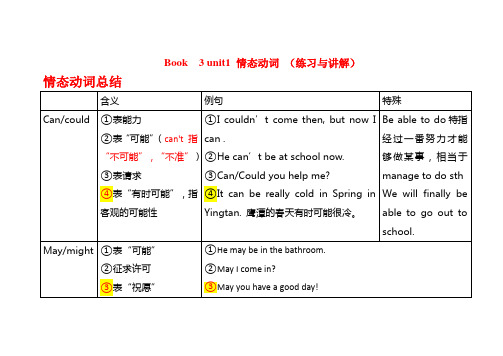新课标必修三Unit 1 情态动词语法及练习
- 格式:ppt
- 大小:490.00 KB
- 文档页数:28

Grammar Structures for Unit 1 Book IIIModal verbs(情态动词)跟踪练习I.单项填空:1.Write in simple English in order that everybody ______ understand you.A. mayB. mustC. shouldD. will2.You _______ miss the lecture, though you ______ have it.A. mustn’t; needn’tB. needn’t; mustn’tC. mustn’t; mustn’tD. can’t; needn’t3.--- Better not have the operation right now.--- ________.A. I mustn’tB. I shouldn’tC. I won’tD. I can’t4.The train was ten minutes late, so I ______ have run all the way from my house to the station.A. couldn’tB. shouldn’tC. needn’tD. mustn’t5.I’m not going simply because I don’t see why I _______.A. willB. wouldC. shouldD. shall6.--- It must be Mr. Li who did it.--- No, it _____ be Mr. Li.A. mustn’tB. can’tC. wouldn’tD. may7.--- It’s getting cloudier and cloudier.--- Yes, I’m afraid it ______ be raining soon.A. mustB. shouldC. mightD. can8.I promised to get there before 5 o’clock, but now the rain is pouring down. They _____ for meimpatiently.A. mat waitB. ought to waitC. could waitD. must be waiting9.--- ______ you make so much noise?--- Sorry, I’ll take care not to.A. Must;B. CanC. MayD. Would10.On Sundays when I was a child, Father and I _____ get up early and go fishing.A. couldB. wouldC. mightD. should11.I ______ have written to him because he phoned me shortly afterwards.A.ought toB. mustC. couldn’tD. needn’t12.--- _____ the plane have taken off on time?--- I’m afraid not. The fog was too thick then.A. NeedB. ShouldC. CanD. Must13.This looks like a different kind of stone. What _____ we do with it?A. willB. shallC. wouldD. do14.He has much money at the beginning of every month, but by the end of it he _____ little left.A. can haveB. will haveC. should haveD. need have15.How _______ you say that you really understand the whole story if you have finished onlypart of the article?A. mustB. needC. mayD. can(Keys: 1. A2. A3. C4. C5. C6. B7. A8. D9. A10. B11. D12. C13. B14. B15. D )。


![新人教必修3_Unit1_Grammar情态动词]](https://img.taocdn.com/s1/m/35b7c822453610661ed9f4a7.png)


Book 3 unit1 情态动词(练习与讲解)情态动词总结most will cherish this learning of free-style.一些学生很可能在这段困难时期忽略他们的家庭作业,然而大部分学生都会珍惜这种自由的学习风格。
4.may/might as well do sth 最好做...;不妨做...We may as well drown ourselves in study to kill time. 我们不妨专注学习来消磨时间。
Ⅰ.用适当的情态动词填空1.When you cross the street, you must be careful with the passing cars.2.It can’t be his mother, for she has been ill at home for a long time.3.We enjoy good weather in January, but sometimes it can be terribly cold.4.I may come to the party with you, but I am not sure.5.When he was young, he would climb the small hill every morning.6.—May I take this seat?—Yes, you may/can.7.Tom comes from Australia, so he can speak English very well.8.If you can pass the driving test, you shall get a new car.9. —Must he come to sign this contract himself?—Yes, he must. /No, he needn’t.10.It is surprising that that mean man should give away his money to the poor.11.—To stop the oil from flowing into the gulf is difficult. What should we do?—Shall the robots have a try?12.They were determined to carry out the plan at first, but then we were able to persuade them to change their minds.13.You mustn’t/ can’t park your car in front of the teaching building, for the students are coming out soon.14.I have told you the truth already. Must I keep repeating it?15.I cannot but admire her courage. 我不得不佩服她的勇气Ⅱ.单项填空1.—I heard they went skating in the mountains last winter.—It ________ be true because there was little snow there.A.may not B.won’tC.couldn’t D.mustn’t解析:选C。
Unit 1 Festivals around the worldSection Ⅲ Grammar ——情态动词(Ⅰ)[思维导图] 情 态 动 词Ⅰ⎩⎪⎪⎪⎨⎪⎪⎪⎧ 基本特征⎩⎪⎨⎪⎧ 有词义,但不能单独作谓语一般无人称和数的变化否定结构:情态动词+not 后接动词原形基本用法⎩⎪⎨⎪⎧ can 与 could may 与 might will 与 would shall 与 should must[语法精讲]一、基本特征1.情态动词有一定的词义,不能单独作谓语,需和实义动词或系动词一起作谓语。
She can speak English though she is six.尽管她才6岁但她会说英语。
2.情态动词一般无人称和数的变化,个别情态动词有现在时和过去时两种时态变化。
They must be in the classroom.他们一定在教室里。
3.构成否定句时,not 放在其后面。
The young man can't carry the big stone.这个年轻人搬不动那块大石头。
4.情态动词后接动词原形。
You should do as I told you.你得照我说的去做。
He said I could use the computer.他说我可以用这台电脑。
We should study hard for our motherland and ourselves.为了我们的祖国和我们自己,我们应该努力学习。
二、基本用法1.can 和 could 的用法(1)表示能力。
She can ride a bike though she is only eight.尽管她才8岁但她会骑自行车。
I managed to find the street, but I couldn't find her house.我想办法找到了那条街,但没找到她的房子。
(注:could 用于否定句时可以表示过去特定的能力)(2)表示猜测,主要用于疑问句或否定句。
人教版高一英语必修三unit1grammar情态动词练习题高中情态动专项练习1. So many mistakes in your homework! You more careful.A. may beB. had toC. would beD. should have been2. She didn't answer the phone, she ______ asleep.A. may beB. must beC. should have beenD. must have been3. The little g irl’s eyes were red. She ______.A. may cryB. must cryC. must be criedD. must have been crying4. He______ his supper now, for the dining hall is still closed.A. can’t be havingB. needn’t be havingC. mustn’t be havingD. shouldn't be having5. I parked my bike behind the building, but now it is gone. It ________ .A. may be stolenB. must be stolenC. must have been stolenD. must have stolen6. The hotel is only a stone’s throw away, you ______ take abus.A. need not toB. not need toC. don't needD. need not7. I am busy now, _______ my brother do it for you ?A. WillB. ShallC. MustD. May8. ---The room is so dirty._______ we clean it?----Of course.A.Will B. Shall C. Would D. Do9. If you have something important to do, you ______ waste any time.A. needn’tB. mustn’tC. may notD. won’t10. “ Don’t get near to it . It is too dangerous!”“_______” .A. Yes, I won’tB. No, I don’tC. No, I can’tD. No, I won’t11. “Can I take it away?”“ You ______ better not.”A. shouldB. couldC. wouldD. had12. You _______ have brought your camera. They all had theirs with them.A. couldn’tB. needn’tC. wouldn’tD. mustn’t— May I park my car here?— No, you ______. No car is allowed to park here.A. may notB. needn’tC. mustn’tD. daren’t13. Someone ______ my umbrella. I found it wet yesterday.A. must be usingB. must have usedC. must useD. must have been using14. — How dangerous it was!— Yes, but for the passer-by’s quick action, the girl ______.A. was drownedB. could have been drownedC. had drownedD. should be drowned15. You ______ scold such a pupil who always keeps silent so seriously that you ______ hurt him.A. should; canB. may; willC. mustn’t; mayD. can’t; must16. — Why does Alice know so much about Angkor Wat?— She ______ have been there, or ...A. mustB. oughtn’t toC. mayD. can’t17. —You may laugh, but I’ve been thinking of becoming a vegetarian.— Oh, you ______ be crazy. You will be hungry all the time.A. mustB. mayC. willD. need18. —What’s the matter with you?—Oh, I’m not feeling well in the stomach. I ______ so much fried fish just now.A. shouldn’t eatB. mustn’t have eatenC. shouldn’t ha ve eatenD. mustn’t eat19. — ______ he have been chosen as captain of the football team?— Yes, he ______.A. Can; must haveB. Must; must haveC. Can; mustD. Must; must20. Miss Wang started at 8 o’clock, and she ______ be there now.A. shou ldC. can’tD. need21. — It must be Mr. Li who did it.— No, it ______ be Mr. Li.A. mustn’tB. wouldn’tC. can’tD. may22. Your trousers are dirty. ______ them for you?A. Shall I washB. Will I washC. Am I going to washD. Am I washing23. You are late for school today. You ______ to school earlier.A. ought to comeB. should have comeC. ought have comeD. should come24. You ought ______ for what you haven’t done.A. not to be punishedB. not be punishedC. to not punishedD. to not be punished25. ______ you please tell me the way to the post office?A. MustB. NeedC. WouldD. Should26. I’m sure he ______ have the computer sooner or later.B. canC. mustD. would27. It has been announced that candidates _______ remain in their seats until all the papers have been collected.A. canB. willC. mayD. shall28. How _______ you say that you really understand the whole story if you have covered only a part of the article?A. canB. mustC. needD. may29. With so much work on hand, you _____ to see the game last night.A. mustn’t goB. shouldn’t goC. couldn’t have goneD. shouldn’t have gone30. Most of the students felt rather disappointed at the English party. They say that it ______ better organized.A. had beenB. had to beC. must have beenD. could have been31. I’m surprised that he _____ in the exam.A. should failB. would have failedC. may have failedD. should have failed32. The little girl _____ there alone.A. not dare goB. dares not goC. dare not goD. dare not to go33. “Must we do it now?” “No, you _____.”A. won’tB. needn’tC. can’tD. don’t34. You _____ to the meeting this afternoon if you have something important to do.A. needn’t to comeB. don’t need comeC. don’t need comingD. needn’t come35. Put on more clothes. You _____ be feeling cold with onlya shirt on.A. canB. couldC. wouldD. must36. There was plenty of times. She _____.A. mustn’t have hurriedB. couldn’t have hurriedC. must not hurryD. needn’t have hurried37. The plant is dead. I _____ it more water.A. will giveB. would have givenC. must giveD. should have given38. You _____ return the book now. You can keep it till next week if you like.A. can’tB. mustn’tC. needn’tD. may not39. It’s still early, you _____.A. mustn’t hurryB. wouldn’t hurryC. may not hurryD. don’t have to hurry40. We _____ for her because she never came.A. mustn’t have waitedB. shouldn’t have waitedC. mustn’t waitD. needn’t wait41. —Please don’t make a noise.—_____. I’ll be as quiet as a mouse.A. Yes, I won’tB. No, I won’tC. No, I willD. Yes, I will42. The young man has made so much noise that he _____ not have been allowed to attend the concert.A. couldB. mustC. wouldD. should43. — Where is John?— He _____ in the library.A. should beB. must beC. can beD. must have been44. Since the road is wet this morning, _____ last night.A. it must rainB. it must be rainingC. it must have rainedD. it must have been rain 45. — Will your brother stay home tonight?—I’m not quite sure. He _____ to the cinema tonight.A. must goB. can goC. may goD. may be going46. She’s already two hours late. What ______ to her?A. can have happenedB. may have happenedC. should have happenedD. must happen47. You must be a writer, _____?A. mustn’t youB. are youC. must youD. aren’t you48. I got up early that morning, but I _____ so because I had no work to do.A. mustn’t have doneB. didn’t need to doC. needn’t have doneD. can’t have done49. He _____ have come here yesterday, but he didn’t.A. couldB. shouldC. ought toD. all the above50. I missed the last bus, so I _____ go home on foot.A. mustB. have toC. mayD. had to51. Everyone _____ do his best for the modernizations of our country.A. canB. mayC. shouldD. might52. Let’s clean our classroom, _____?A. will y ouB. don’t weC. shall weD. do you53. Let us play basketball, ______?A. will youB. don’t weC. shall weD. do you54. He asked me for this book many times. Please tell him that he _____ have it tomorrow.A. mustB. mayC. shallD. both B and C。
专題嫁习I •用适当的情态动词填空1. When you cross the street, you must be careful with the passing cars.2. It can ' t be his mother, for she has been ill at home for a long time.3. We enjoy good weather in January, but sometimes it can be terribly cold.4. I may come to the party with you, but I am not sure.5. When he was young, he would climb the small hill every morning.6. —May I take this seat?—Yes, you may/can .7. Tom comes from Australia, so he can speak English very well.8. If you can pass the driving test, you shall get a new car.n .单项填空1. — I heard they went skati ng in the mountains last win ter.—It _______ be true because there was little snow there.A. may not B . won ' tC. couldn ' t D . mustn ' t解析:选C。
句意:“我听说他们去年冬天去山区滑雪了。
”“那不可能是真的,因为那里几乎没有雪。
” couldn ' t “不可能”,表示有把握的否定推测。
may not "可能不与语境不符;won ' t "不会”;mustn ' t “禁止”。